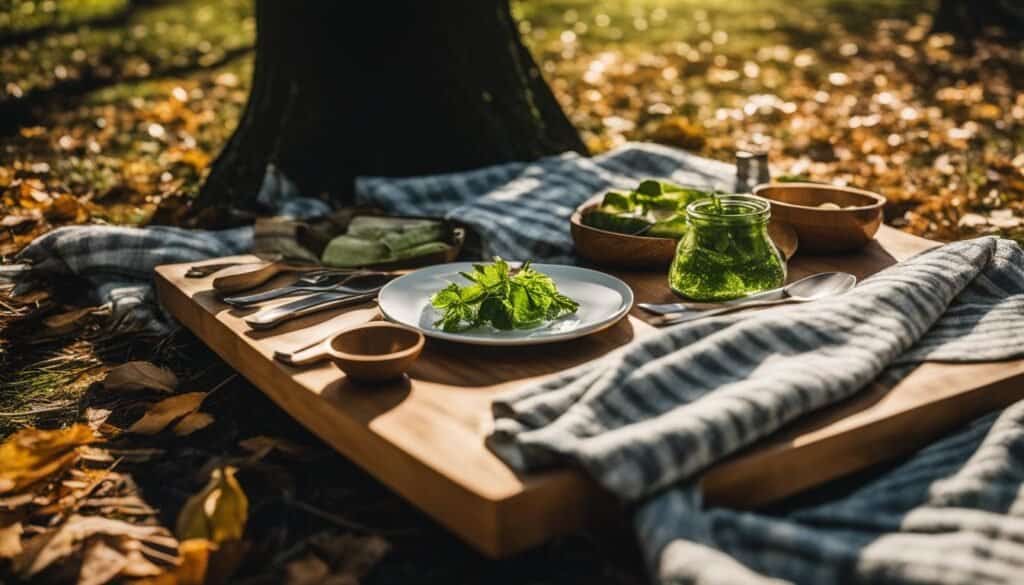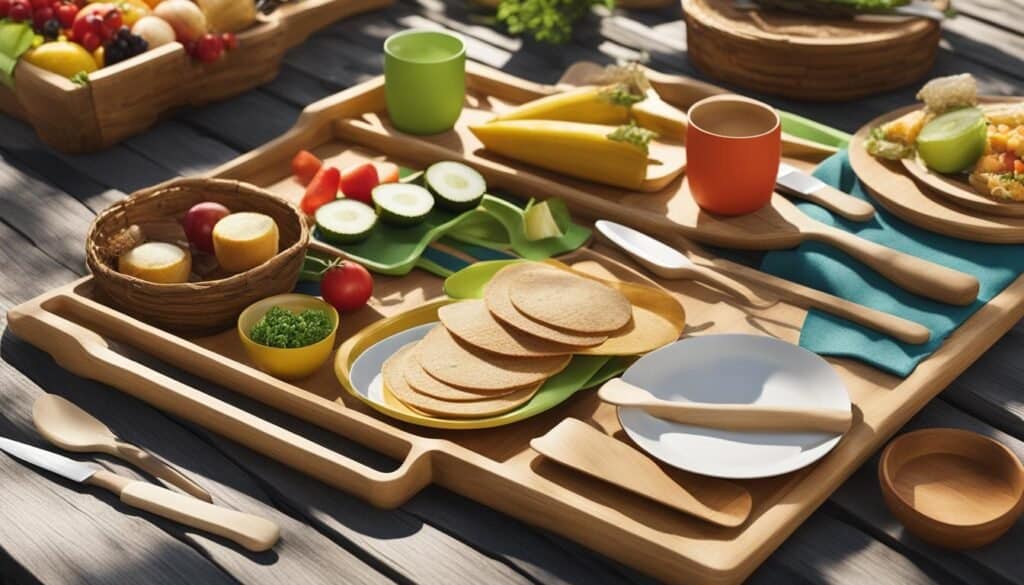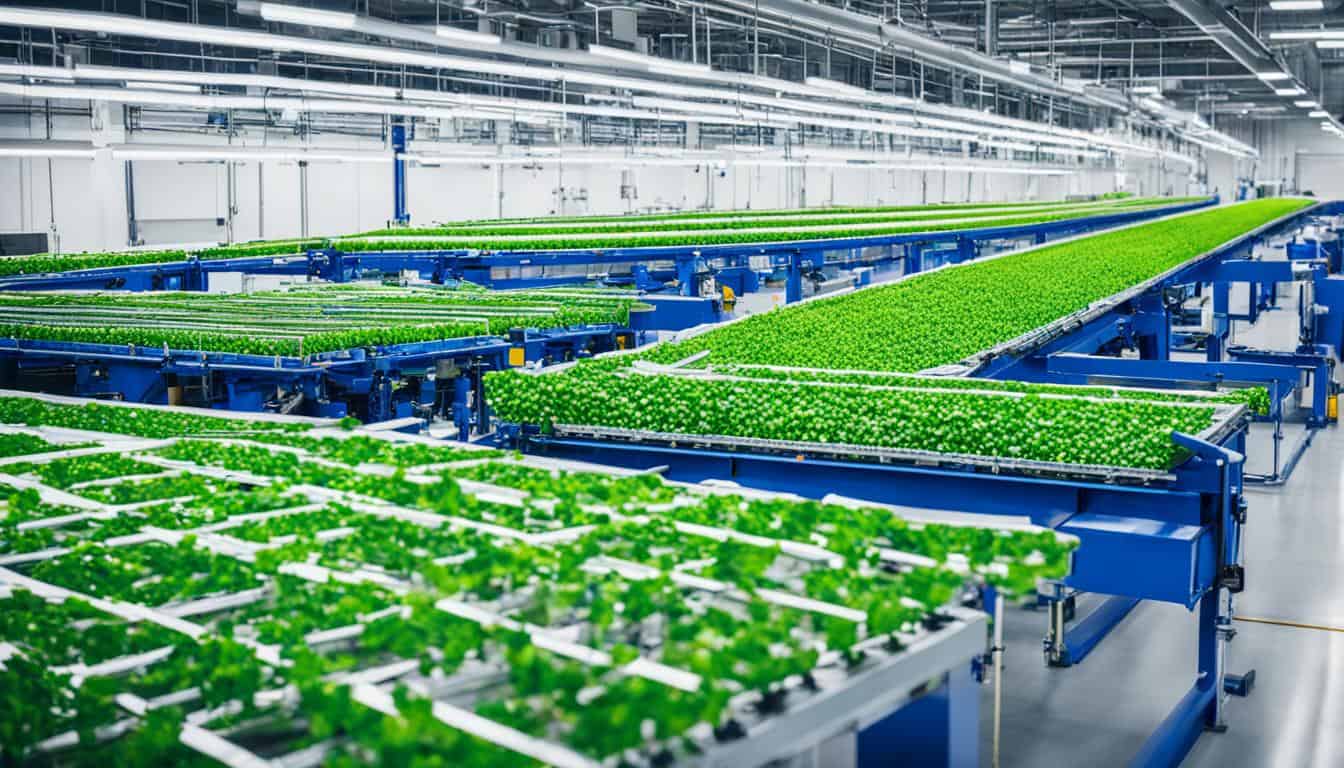If you’re seeking to plan the perfect picnic without leaving a trail of plastic waste behind, look no further than biodegradable utensils for eco picnics. These eco-friendly disposable utensils provide a guilt-free option by decomposing naturally and minimizing environmental impact. Made from renewable resources like bamboo, cornstarch, and sugarcane bagasse, compostable cutlery offers a responsible approach to dining outdoors while still maintaining a beautiful aesthetic. Let’s dive into the world of sustainable picnic practices and explore how these environmentally friendly dining options are transforming outdoor gatherings.
Key Takeaways
- Biodegradable utensils are made from renewable resources like bamboo, cornstarch, and sugarcane bagasse.
- Eco-friendly disposable utensils decompose naturally, reducing waste in landfills.
- Compostable cutlery supports sustainable picnic practices and promotes a green lifestyle.
- Biodegradable utensils are lightweight, functional, and visually pleasing for outdoor dining events.
- Using eco-friendly alternatives for outdoor dining helps reduce our reliance on single-use plastics and conserve natural resources.
Embracing a Green Lifestyle with Sustainable Picnic Practices
Transitioning to a green lifestyle involves making conscious changes in our daily routines, including the way we enjoy outdoor dining. Sustainable picnic practices are a significant part of this change, reducing reliance on single-use plastics and other environmentally harmful materials.
“A green lifestyle is about making choices that positively impact the environment, and sustainable picnic practices are a perfect opportunity to start.”
When planning eco-friendly outdoor meals, consider utilizing biodegradable utensils made from materials like bamboo, plant-based plastics, and other sustainable materials. These alternative options help lessen pollution and conserve natural resources while still ensuring a convenient and enjoyable experience.
- Pack your picnic with reusable containers, bags, and wraps.
- Choose biodegradable utensils and tableware over single-use plastics.
- Opt for locally-sourced food items to reduce carbon footprint.
- Minimize food waste by planning portion sizes carefully.
- Dispose of waste properly and take responsibility for your own trash.
By following these sustainable picnic practices, you can contribute to a significant decrease in your individual carbon footprint while also enjoying meals outdoors with your friends and family.
| Single-Use Plastic | Eco-Friendly Alternatives |
|---|---|
| Plastic cutlery | Bamboo or wooden cutlery |
| Plastic plates and cups | Palm leaf plates, wheat straw bowls, sugarcane bagasse cups |
| Plastic food packaging | Biodegradable or reusable food containers |
| Plastic straws | Paper or stainless steel straws |
| Plastic bags | Reusable tote bags or cloth produce bags |
By adopting a green lifestyle and embracing sustainable picnic practices, you can enjoy quality outdoor dining experiences, knowing that your choices positively impact the environment. With a wealth of beautiful and practical eco-friendly alternatives widely available, your next sustainable picnic can be equally stylish and environmentally responsible.
The Wonders of Biodegradable Utensils in Outdoor Dining
Biodegradable utensils transform the way we approach outdoor dining, offering both environmental benefits and aesthetic value. The lifecycle of biodegradable picnicware is an essential aspect of this sustainability, taking advantage of renewable resources and compostable materials for an earth-friendly dining experience. Additionally, the design variety allows for stylish and environmentally-conscious feasting in the great outdoors.
From Earth to Table: The Lifecycle of Biodegradable Picnicware
The lifecycle of biodegradable picnicware starts with the use of renewable materials in manufacturing. Plant-based plastics, bamboo, and other compostable resources are transformed into utensils, plates, and bowls, providing us with sustainable alternatives to traditional disposable tableware. After their one-time use, these products can be disposed of through composting, eventually breaking down into organic matter that enriches the soil. This process contributes to the overall sustainability in dining, ultimately preserving the environment for future generations.
Earth911: Use EcoProducts Compostable Square Sugarcane Plates, which are made from renewable sources and are certified to be biodegradable according to the ASTM D6868 standard. These plates are perfect for picnics and have a smaller environmental impact.
Biodegradable picnicware breaks down into organic matter that enriches soil, completing a cycle that contributes to the preservation of the environment.
The Aesthetic Appeal of Eco-Friendly Tableware at Your Picnic
The aesthetic appeal of eco-friendly tableware adds a touch of elegance to any outdoor dining event. Not only do they promote environmentally-conscious practices, but they also come in a variety of stylish designs to suit different personal tastes. Options like rustic wooden cutlery, chic palm leaf plates, and modern plant-based plastic dinnerware allow us to effortlessly elevate our picnic setups while taking care of the environment.
- Rustic wooden cutlery: Combines traditional charm with sustainability
- Palm leaf plates: Natural and unique design for an earthy touch
- Plant-based plastic dinnerware: A cleaner, modern look without the environmental impact
| Materials | Aesthetic Appeal | Environmental Impact |
|---|---|---|
| Bamboo | Rustic and elegant | Biodegradable and renewable |
| Palm Leaf | Natural and unique | Compostable and sustainably sourced |
| Plant-Based Plastic | Modern and versatile | Biodegradable and made from renewable resources |
As we continue to enjoy outdoor dining and picnics, choosing biodegradable utensils and tableware allows us to fully embrace the beauty of nature while minimizing harm to the environment. From their earth-friendly lifecycle to their aesthetic versatility, biodegradable picnicware allows us to dine responsibly and stylishly, embodying the essence of eco-friendly living.
Biodegradable vs. Traditional Plastic: A Comparative Analysis
When it comes to choosing eco-friendly alternatives for picnic utensils, it’s essential to understand the difference between biodegradable and traditional plastic. A comparative analysis helps in making informed decisions on sustainable choices, as both options impact the environment in different ways.
Environmental Impact: One of the primary distinctions between biodegradable and traditional plastic lies in their environmental impact. Biodegradable utensils decompose naturally, thereby reducing pollution and habitat destruction associated with plastic waste. In contrast, traditional plastic can take hundreds of years to break down, leading to lasting damage to ecosystems and landscapes.
“The choice between biodegradable and traditional plastic utensils significantly affects our natural surroundings, making it essential to consider the long-term consequences of our dining choices.”
Next, let’s analyze the performance of these two types of materials as picnic utensils.
| Performance Aspect | Biodegradable Utensils | Traditional Plastic Utensils |
|---|---|---|
| Durability | Comparable to plastic | Reliable and durable |
| Heat Resistance | Varies by material (generally less than plastic) | Resistant to heat (within reasonable limits) |
| Breakage Tendency | Variable (depending on material quality and manufacturer) | Typically robust (unless under too much pressure) |
As we can see from the table above, both biodegradable and traditional plastic utensils offer durability and reliability. However, the heat resistance and breakage tendency of biodegradable options might vary, depending on the material used and manufacturing quality.
In conclusion, though there may be minor variations in performance, biodegradable utensils offer a clear advantage over traditional plastic in terms of environmental impact. Choosing biodegradable materials for your outdoor dining needs demonstrates a commitment to sustainable choices that help protect our planet.
Top Choices in Biodegradable Utensils for Your Next Eco Picnic
With the increasing demand for eco-friendly picnic supplies, a variety of sustainable materials are revolutionizing the world of disposable eating utensils. The top biodegradable utensils that combine both style and functionality are outlined below.
Bamboo Cutlery: Combining Durability and Sustainability
Derived from renewable bamboo resources, bamboo cutlery has become a popular choice for eco-picnics. They offer the same durability and reliability as traditional utensils while being entirely sustainable. Handcrafted and showcasing a distinct natural grain, bamboo utensils add a charming, rustic element to picnic spreads. Moreover, since bamboo is a fast-growing plant, it is an abundant and sustainable resource for producing eco-friendly eating utensils.
“Bamboo cutlery is not only environmentally friendly, but it adds elegance to any outdoor gathering.”

Palm Leaf Plates and Bowls: Nature’s Own Dinnerware
Palm leaf dinnerware is another top choice in eco-friendly picnic supplies, offering a natural alternative to single-use plastics. These versatile pieces are light yet sturdy, perfect for various outdoor meals. Harvested from naturally fallen leaves of the Areca palm tree, they introduce an organic aesthetic to eco picnics, and since they are completely biodegradable, you can enjoy your meal guilt-free.
- Palm leaf plates
- Eco-friendly bowls
Sugarcane and Wheat Straw Options: The Future of Disposable Tableware
The future of disposable tableware is looking brighter with the emergence of sugarcane and wheat straw options. Made from plant-based materials, these utensils offer a heat-resistant and robust product, perfect for various foods. They maintain the convenience of traditional disposables while being kind to the environment.
| Material | Advantage |
|---|---|
| Sugarcane plates | Biodegradable, made from renewable resources |
| Wheat straw bowls | Heat-resistant and sturdy for various foods |
By choosing any of these top biodegradable utensils for your next eco picnic, you can enjoy dining outdoors while supporting a greener lifestyle and protecting the environment.
Where to Find Eco-Friendly Picnic Supplies
Eco-friendly picnic supplies are accessible through various brands and retailers committed to sustainability. Many companies such as Restaurantware and PacknWood offer a comprehensive selection of biodegradable products, including utensils, plates, and serving pieces, catering to the rising demand for eco-conscious tableware.
“By supporting eco-product retailers, we can help contribute to a greener future for our planet.”
Aside from dedicated online stores, mainstream supermarkets and retailers are also starting to stock eco-friendly picnic supplies in response to consumer demand. Keep an eye out for green picnic accessories during your regular visits to Walmart, Target, or your local grocery store.

When embarking on sustainable shopping, it’s vital to research and understand the materials used in biodegradable tableware brands. To help get you started, here’s a summary of some popular brands:
| Brand | Products Offered | Materials Used |
|---|---|---|
| Fallen Palm | Plates, bowls, and platters | Palm leaves |
| GreenWorks | Utensils, plates, bowls | Plant-based plastics, biodegradable materials |
| Repurpose | Party kits, cutlery, tableware | Compostable sugar cane fiber, plant-based plastics |
| EcoSouLife | Plates, cutlery, cups, bowls | Rice husk fiber, bamboo fiber, plant-based plastics |
| RiverGreen | Cutlery, plates, bowls, servingware | Polylactic Acid (PLA), plant-based materials |
When searching for eco-friendly picnic supplies, remember to look for certification logos or other indicators that a product meets industry standards for sustainability. Additionally, choosing locally produced options can further minimize your carbon footprint.
Wild & Stone: Use reusable cutlery, straws, plates, and glasses instead of disposable ones. Bamboo cutlery sets, metal or bamboo drinking straws, and bamboo plates are great eco-friendly alternatives that also reduce the risk of plastic leeching into food
Investing in reusable green picnic accessories like cloth napkins, a sustainable picnic blanket, and washable eco-friendly containers is another way to ensure that you are supporting sustainable shopping practices when enjoying your outdoor dining adventures.
The Role of Utensils in Reducing Your Carbon Footprint
The awareness for environmental conservation is growing on a global scale, and a significant factor contributing to a more sustainable world involves the selection of biodegradable and compostable materials in everyday use. Among these materials, biodegradable utensils are playing a crucial role in carbon footprint reduction.
How Choosing Biodegradable Options Benefits the Environment
By choosing to use compostable utensils, individuals can have a profound impact on the environment. These utensils, comprised of sustainable materials like plant-based plastics and bamboo, offer a host of benefits in terms of environmental impact and conservation.
- Resource conservation: Utilizing renewable materials like bamboo ensures that forests are not depleted at unsustainable rates, promoting proper ecological balance and responsible resource management.
- Landfill waste reduction: Compostable utensils decompose significantly faster than their non-biodegradable counterparts. This leads to a reduction in landfill waste, as these products eventually break down into organic matter, enriching the soil and completing a natural lifecycle.
- Prevention of pollution: By replacing traditional plastic utensils, biodegradable alternatives help prevent pollution, as they decompose without releasing harmful compounds. This helps foster a healthier environment for the future.
By choosing biodegradable utensils, individuals can significantly reduce their negative impact on the environment, supporting the global shift towards sustainable dining and responsible consumption practices.
| Environmental Aspect | Biodegradable Utensils Benefits |
|---|---|
| Resource Conservation | Utilization of renewable materials which promote ecological balance and responsible resource management |
| Landfill Waste Reduction | Rapid decomposition of materials, resulting in less waste for landfills |
| Prevention of Pollution | Compostable materials break down without harm, avoiding the release of hazardous compounds into the atmosphere |
“Sustainable dining is not just a trend, but a necessary lifestyle choice now for the future of our planet. Together, we make a difference.” – Author Unknown
Ultimately, the role of utensils in reducing carbon footprint lies in consumers’ willingness to make more environmentally conscious choices. By incorporating biodegradable alternatives in their daily lives, individuals can actively participate in the journey towards environmental conservation and sustainable living.
Incorporating Biodegradable Utensils into Your Eco-Friendly Lifestyle
Biodegradable utensils are becoming increasingly popular as more people embrace an eco-friendly lifestyle and realize the need for sustainable habits. By adopting these utensils, you can make a significant positive impact on the environment and contribute to environmental stewardship.
Here are some practical ways to integrate biodegradable utensils into your daily life:
- Opt for biodegradable or compostable tableware when hosting events such as picnics, barbecues, or gatherings.
- Replace single-use plastic utensils in your home with durable and eco-friendly alternatives like bamboo or plant-based plastic cutlery.
- Encourage your friends, family, and coworkers to use sustainable utensils and spread awareness about their environmental benefits.
- Choose to support companies, like Restaurantware and PacknWood, that offer biodegradable products, prioritizing eco-friendly brands for your shopping needs.
Using biodegradable utensils is not only an eco-conscious decision but also one that comes with a variety of aesthetic and functional benefits:
- Bamboo cutlery – Lightweight, sturdy, and visually appealing, bamboo utensils introduce a rustic charm to any meal.
- Palm leaf plates and bowls – These lightweight, yet durable options are perfect for holding various types of food and add an organic touch to your dining experience.
- Sugarcane and wheat straw tableware – These heat-resistant and robust options showcase the future of sustainable disposable tableware.
Keep in mind that sustainable practices extend beyond just the choice of utensils. Adopt additional green habits by recycling and composting, reducing water and energy consumption, and utilizing reusable bags and containers when shopping.
Embracing a sustainable lifestyle is a continuous journey, and incorporating biodegradable utensils is a significant step towards reducing your carbon footprint and safeguarding our planet.
Conclusion on Compostable Utensils
As we reach the end of our exploration into biodegradable utensils for eco picnics, it is clear that they play a vital part in revolutionizing outdoor dining. By offering a practical and eco-friendly solution, we are able to balance convenience with ecological responsibility. The future of outdoor dining is set to become greener, supporting collective efforts towards a more sustainable world.
With a wide array of attractive and functional options, such as bamboo cutlery, palm leaf plates, and sugarcane-based tableware, our picnics can be both stylish and environmentally friendly. This shift in consumer preferences showcases our growing commitment to green initiatives and making conscious choices for the betterment of our planet.
So let’s embrace a future of outdoor dining that promotes ecological responsibility and eco-friendly practices. Through the simple act of choosing biodegradable utensils and sustainable picnic supplies, we can contribute to a healthier environment and set the stage for the next generation to continue our strides towards a greener world.
FAQ on Biodegradable Utensils for Eco Picnics
Q: What are biodegradable utensils?
A: Biodegradable utensils are dining tools, such as forks, spoons, and knives, that are made from organic materials and can naturally decompose, reducing environmental impact.
Q: How do biodegradable utensils help the environment?
A: Biodegradable utensils help the environment by reducing plastic waste, minimizing the consumption of non-renewable resources, and lowering carbon emissions during production.
Q: Are biodegradable utensils durable?
A: Biodegradable utensils are designed to be sturdy enough for typical use and are suitable for both hot and cold foods. However, they may not be as durable as traditional plastic or metal utensils.
Q: Can biodegradable utensils be reused?
A: Some biodegradable utensils are reusable, but most are designed for single-use to ensure hygienic dining experiences. Reusable options are also available for those seeking a more sustainable solution.
Q: What are the benefits of using eco-friendly portable utensils for picnics?
A: Using eco-friendly portable utensils for picnics helps to reduce plastic waste, supports sustainable practices, and allows picnickers to enjoy meals in nature without harming the environment.
Q: Are there options for compostable disposable utensils for picnics?
A: Yes, there are compostable disposable utensils specifically designed for picnics, allowing users to enjoy the convenience of disposable items while minimizing environmental impact through composting.
Q: Where can I find customer reviews for biodegradable utensils?
A: Customer reviews for biodegradable utensils can often be found on the websites of retailers selling eco-friendly dining products, as well as on independent review platforms and social media.
Q: Can I use biodegradable utensils for both hot and cold foods?
A: Yes, many biodegradable utensils are suitable for use with both hot and cold foods, making them versatile options for picnics, outdoor dining, and eco-friendly events.
Q: Are there eco-friendly dining sets available for picnics?
A: Yes, there are eco-friendly dining sets available for picnics, typically including biodegradable utensils, plates, and napkins, providing a comprehensive solution for environmentally conscious picnickers.
Q: How can I ensure that my outdoor dining experience is environmentally friendly?
A: You can ensure an environmentally friendly outdoor dining experience by choosing biodegradable utensils, eco-friendly picnic sets, and reusable cloth napkins, and by properly disposing or composting used items.
Source Links
- https://ecofriendlyguides.com/eco-friendly-disposable-utensils/
- https://www.linkedin.com/posts/pac-trading-pty-ltd_ecofriendlyproducts-ecofriendlypackaging-activity-7033956945501851648-nMZc?trk=public_profile_like_view
- https://www.anchenggy.com/blog/top-100-disposable-tableware-brands-in-america.html





Leave a Reply